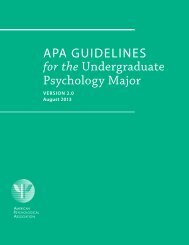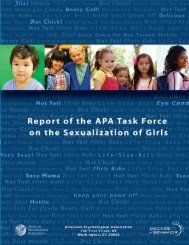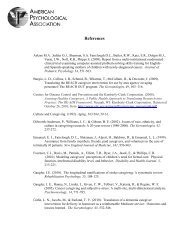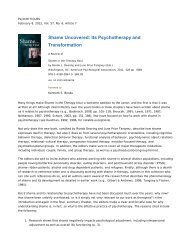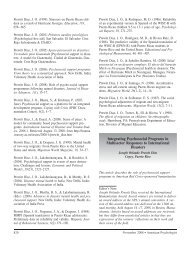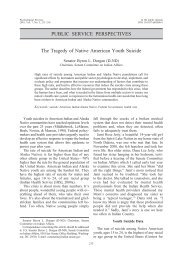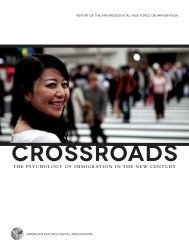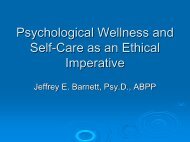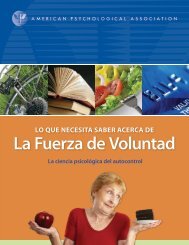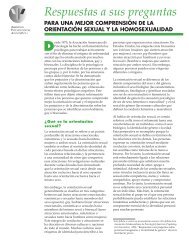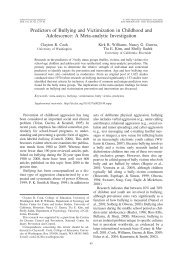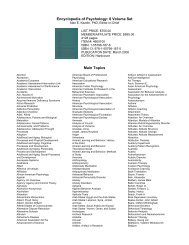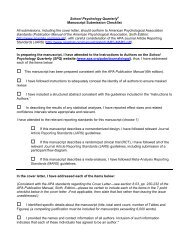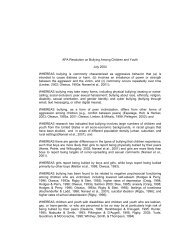James McKeen Cattell, Nicholas Murray Butler, and Academic ...
James McKeen Cattell, Nicholas Murray Butler, and Academic ...
James McKeen Cattell, Nicholas Murray Butler, and Academic ...
Create successful ePaper yourself
Turn your PDF publications into a flip-book with our unique Google optimized e-Paper software.
108 SOKAL<br />
Foundation for the Advancement of Teaching. Once he had the AAUP’s report in<br />
h<strong>and</strong>, he formally requested Columbia to pay this pension <strong>and</strong> asked the Association<br />
to help him pursue the matter. 201 The AAUP Bulletin published <strong>Cattell</strong>’s<br />
request <strong>and</strong> the trustees’ formal rejection soon afterward <strong>and</strong>—again after some<br />
to-ing <strong>and</strong> fro-ing—the Association appointed a committee to consider the “refusal<br />
of a retiring allowance.” In January 1919, it issued a wishy-washy report that<br />
avoided calling on Columbia to pay <strong>Cattell</strong>’s pension <strong>and</strong> simply concluded that<br />
“in refusing to grant the pension claimed by Dr. <strong>Cattell</strong> the Trustees of Columbia<br />
University . . . increased the punishment inflicted upon him by his dismissal.” 202<br />
The difference in tone between this timid statement <strong>and</strong> the conclusions of the<br />
AAUPs earlier committee shocked <strong>Cattell</strong>, <strong>and</strong> he asked the Association both to<br />
clarify the report’s conclusions <strong>and</strong> to look further into “the danger of [universities]<br />
using the accrued value of the pension to control <strong>and</strong> intimidate the professor.”<br />
Nothing came of this request, however, <strong>and</strong> <strong>Cattell</strong>—who had earlier<br />
questioned the financial stability of the Carnegie Foundation <strong>and</strong> criticized its<br />
pension <strong>and</strong> annuity policies 203 —took it upon himself to address what he saw<br />
were the Foundation’s inequities. Following the precedent of University Control,<br />
he first published two articles in School <strong>and</strong> Society denouncing the Foundation<br />
<strong>and</strong> its practices <strong>and</strong> then asked professors throughout the country for comments.<br />
Many who responded feared or even experienced the kind of “control <strong>and</strong><br />
intimidate[ion]” that <strong>Cattell</strong> had asked the AAUP to investigate, <strong>and</strong> he then<br />
gathered his articles, <strong>and</strong> these responses, <strong>and</strong> earlier AAUP reports on the<br />
Foundation’s activities into Carnegie Pensions, published in 1919. 204 This book<br />
attracted positive attention from the “liberal” press that had previously praised<br />
<strong>Cattell</strong>’s efforts—for example, The Nation wrote of “Pensions that are Not<br />
Pensions” —<strong>and</strong> late 20th-century scholars suggest that <strong>Cattell</strong>’s earliest critiques<br />
played a role in the 1918 emergence of the more financially secure Teachers<br />
Insurance <strong>and</strong> Annuity Association. 205 In any event, the overall incident soured<br />
<strong>Cattell</strong>’s relations with the AAUP.<br />
These grew even worse when Seligman—honored by AAUP members for his<br />
role in preparing the 1915 “Declaration”—became the Association’s president in<br />
1921. <strong>Cattell</strong> had despised Seligman since May 1917, when he apparently reneged<br />
on a “gentlemen’s agreement” not to circulate <strong>Cattell</strong>’s letter of apology. Early in<br />
1918 <strong>Cattell</strong> published another fly leaf—“Confidential Statement for Members of<br />
the Faculty Club” entitled “Memories of My Last Days at Columbia”—that<br />
rehashed the events of the previous year <strong>and</strong> presented Seligman in the most<br />
unfavorable light possible. 206 <strong>Cattell</strong> thus deplored this election <strong>and</strong> he peppered<br />
the AAUP’s Secretary <strong>and</strong> others with a series of critical letters. 207 These led the<br />
AAUP Council to seek legal advice <strong>and</strong> to review its practices, <strong>and</strong> to soon<br />
conclude that “no further action on [<strong>Cattell</strong>’s] protest is necessary.” The Council<br />
may not have gone as far as Woodbridge had been tempted to in March 1917: to<br />
“laugh at <strong>Cattell</strong> <strong>and</strong> treat him as a fool.” However, as one Council member wrote,<br />
“I do not think that <strong>Cattell</strong> should be taken too seriously.” 208<br />
While <strong>Cattell</strong> sought redress through the AAUP, he also consulted several<br />
lawyers—including Hillquit <strong>and</strong> Roscoe Pound, the Dean of Harvard Law<br />
School 209 —as to other steps he might take, at first to regain his professorship <strong>and</strong><br />
then (by the middle of 1918) to have Columbia (with or without support from the<br />
Carnegie Foundation) pay him his pension. After several false starts, <strong>and</strong> further



